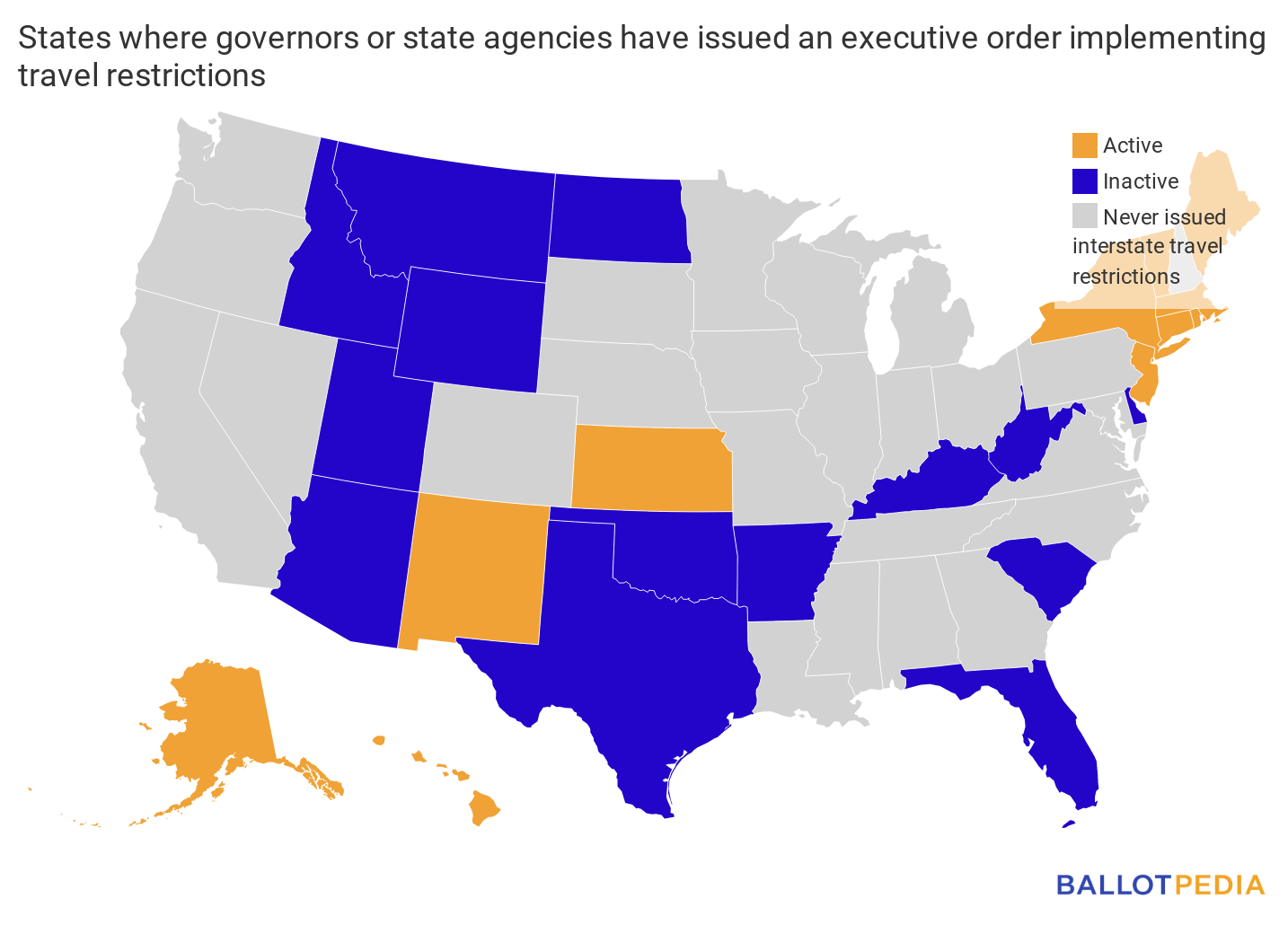Welcome to Documenting America’s Path to Recovery, where we track the status of reopening in all 50 states. Today we look at new restrictions in Nebraska and New Mexico, the extension of the state of emergency in Vermont, travel restrictions, and more. Want to know what happened yesterday? Click here.
The next 72 hours
What is changing in the next 72 hours?
- Massachusetts (divided government): The statewide moratorium on evictions is scheduled to expire Saturday, Oct. 17. Gov. Charlie Baker (R) said he would not extend it.
Since our last edition
What is open in each state? For a continually updated article on reopening status in all 50 states, click here.
- Georgia (Republican trifecta): On Thursday, Oct. 15, Gov. Brian Kemp (R) extended the executive order outlining the state’s coronavirus restrictions through Oct. 31. The order includes requirements for businesses, including bars and restaurants, and a cap on gatherings larger than 50 people where social distancing can’t be followed.
- Illinois (Democratic trifecta): The Illinois Department of Public Health added eight more counties to the state’s warning level classification, bringing the total number of warning-level counties to 34. The state uses the classification system to identify counties that may need additional mitigation measures.
- Nebraska (Republican trifecta): On Friday, Oct. 16, Gov. Pete Ricketts (R) said new restrictions would take effect statewide on Oct. 21 in response to increasing coronavirus-related hospitalizations. Restrictions include a reduction in the indoor gatherings limit from 75% capacity to 50%, and a requirement that restaurants and bar patrons remain seated unless ordering, going to the bathroom, or playing a game.
- New Mexico (Democratic trifecta): Gov. Michelle Lujan Grisham (D) added additional restrictions to the state’s public health order, effective Oct. 16. Bars and restaurants that serve alcohol have to close by 10 p.m. every evening, and gatherings are limited to a maximum of five individuals.Travelers from states with COVID-19 positivity rates exceeding 5% can no longer present a recent negative coronavirus test to avoid New Mexico’s 14-day self-quarantine requirement. Health Secretary Kathyleen Kunkel extended the state’s stay-at-home order through Nov. 13.
- North Dakota (Republican trifecta): On Wednesday, Oct. 14, Gov. Doug Burgum (R) announced he would move 16 counties into the “high risk” category on Oct. 16 at 5:00 p.m. due to a spike in coronavirus cases. Bars, restaurants, and large venues in “high risk” areas are advised to cap capacity at 25% or 50 people in total.
- Oregon (Democratic trifecta): Gov. Kate Brown (D) announced Lane County was added to the state’s County Watch List.
- Vermont (divided government): On Thursday, Oct. 15, Gov. Phil Scott (R) extended the state of emergency through Nov. 15.
|
Daily feature: Travel restrictions
Every Friday, we take a closer look at the restrictions governors and state agencies have placed on interstate travelers, including a recap of the week’s travel-related news. To see our full coverage of travel restrictions enacted in response to the coronavirus pandemic, click here.

Overview
To date, 25 states issued at least one executive order restricting interstate travel. Of the 25 executive orders governors or state agencies issued restricting out-of-state visitors, at least 14 have been rescinded. Eleven states have active travel restrictions.
Weekly recap
- On Oct. 15, Hawaii’s pre-travel testing program went into effect, allowing visitors to avoid a 14-day quarantine requirement if they can present a negative COVID-19 test taken within 72 hours of arrival. Travelers who test positive or whose results are pending will need to quarantine.
- On Oct. 14, the Ohio Department of Health updated its travel advisory to include travelers from Indiana. The advisory asks visitors from states reporting positive testing rates of 15% or higher to self-quarantine for two weeks.
- On Oct. 13, Govs. Ned Lamont (D-Conn.), Phil Murphy (D-N.J.), and Andrew Cuomo (D-N.Y.) announced that Michigan, Virginia, and Ohio had been added to the tristate quarantine list. The list includes 38 states and territories.
Additional activity
In this section, we feature examples of other federal, state, and local government activity, private industry responses, and lawsuits related to the pandemic.
- On Oct. 15, Judge Edward Scott of Florida’s Marion County Circuit Court declined to block President Donald Trump (R) from holding a campaign rally at the Ocala International Airport on Oct. 16. Chanae Jackson, a Marion County resident whose two teenage children had been diagnosed with Covid-19, filed suit against Trump’s campaign on Oct. 14, alleging “her family cannot afford to experience Covid-19 again.” Jackson alleged “Trump’s appearance while infected – in defiance of his own experts’ guidance – will embolden hundreds of his supporters to attend unmasked and undistanced.” In his ruling, Scott ruled Jackson had failed to meet the standard for issuance of an injunction, writing that “a prospective injury must be more than a remote possibility.” Trump’s campaign did not comment on the lawsuit, and the event was expected to proceed as planned.
|


